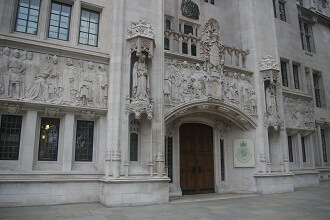Judges Claim That Rule of Law in UK Will be at Risk after Brexit
Judges Claim That Rule of Law in UK Will be at Risk after Brexit

Four senior judges have warned that the legal implications of the UK leaving the EU have not been thought through, and could potentially endanger the independence of the British judiciary and overwhelm the Supreme Court.
Giving evidence to a parliamentary select committee, Lord Neuberger, Lord Thomas, Lord Hope and Sir Konrad Schliemann argued that they struggled to see how the British courts would co-operate with EU judges and legal systems following the UK’s departure from the bloc. In addition, the judges also shared their critiques of government plans to give judges a wide discretion in interpreting the power of decisions of the European Court of Justice (ECJ) after Brexit.
Lord Neuberger, the former president of the Supreme Court, said:
“The problem … is that the judge [will be moving towards] accepting diplomatic and political factors in following the [ECJ]. This is an uncomfortably wide discretion. The judge will have to decide what factors to take into account … It would be better not to have a system where judges are free to take [such matters] into consideration.”
Lord Thomas, the recently retired Lord Chief Justice agreed. He said that giving judges such wide discretion would create a “very real problem for the independence of the judiciary if this is not clarified.”
Lord Thomas also questioned whether, once an independent British jurisprudence had been established by the Supreme Court following the UK’s exit from the EU, any UK firms would want to use it if the legislation did not mirror that of the continent, noting: “Very little thought has been given to that.”
European Court of Justice is ‘needed for judicial and security cooperation’
Lord Hope, the former deputy president of the Supreme Court, also told the committee that the ECJ would be necessary for judicial and security cooperation. He said: “There was a glimmer of light in the prime minister’s speech in Florence where she referred to [security and judicial cooperation] . . . I can see it’s possible to design such a system but how you can do it without involving the ECJ, I don’t know.”
Sir Konrad Schliemann, who served as the UK judge on the ECJ between 2004 and 2012, observed:
“What we have to learn to do is also to look at problems from the [perspective of the] other 27 EU members when we are trying to agree. There’s going to be a certain reluctance to set up a new parallel scheme compared with the existing Efta [court] which has already been grafted into the ECJ.”
Erasing the red line?
Prime minister Theresa May has previously made the rejection of the jurisdiction of the ECJ a “red line” after Brexit, affirming that the UK Supreme Court would be the “ultimate arbiter” of UK jurisdiction in the wake of Britain’s departure. This “red line” in the Brexit negotiations has been backed by several euro-sceptic MPs and voters, who have put pressure on Mrs May to uphold her stance.
However, recent talks between Mrs May and EU negotiators have suggested that the prime minister may now be softening her position. In a bid to overcome ongoing stagnation in discussions with EU politicians, in which the EU has demanded legal protections for European citizens living in the UK post-Brexit, Mrs May is now reportedly considering a potential referral system to the ECJ for European citizens living in the UK after Brexit.
Immigration Minister Brandon Lewis told MPs on the home affairs select committee that a potential partnership between the ECJ and the UK courts had not yet been ruled out. He said that the issue was “part of the negotiations and this has not concluded yet.”
Contact our legal experts today
For advice on steering your organisation through Brexit, strategic planning and fulfilling your business objectives, please contact our experienced solicitors today on 03456 381381 or email enquiries@ibblaw.co.uk.
